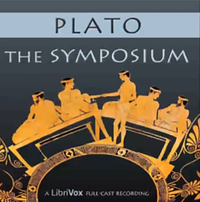You need to sign in or sign up before continuing.
Take a photo of a barcode or cover
challenging
informative
inspiring
reflective
medium-paced
informative
reflective
medium-paced
"Inclus dans l'objet a, c'est l'agalma, le trésor inestimable qu'Alcibiade proclame être enfermé dans la boîte rustique qui lui forme la figure de Socrate. Mais observons que c'est affecté du signe (-). C'est parce qu'il n'a pas vu la queue de Socrate, on nous permettra de le dire après Platon qui ne nous ménage pas les détails, qu'Alcibiade le séducteur exalte en lui l'agalma, la merveille qu'il eût voulu que Socrate lui cédât en avouant son désir : la division du sujet qu'il porte en lui-même s'avouant avec éclat de cette occasion." (Ecrits p825)
inspiring
reflective
medium-paced
challenging
funny
lighthearted
reflective
relaxing
slow-paced
Um dos meus preferidos de Platão! Consegue ser cômico e filosófico ao mesmo tempo. Um primor literário!
informative
inspiring
mysterious
reflective
medium-paced
challenging
funny
hopeful
reflective
medium-paced
I read this book years ago and revisited it for a book club.
The passage of time has removed scales from my eyes and my own experiences of the world can now be seen within the different characters.
For me, there is a loose thread of truth strung through all the stories told, from Phaedrus discussing honour and the types of love (perhaps agape and eros), Aristophanes telling how Zeus split the whole and we have been searching for our other half, to (of course) Socrates’ explanation from Diotima; that really love is about immortality “Like someone using a staircase, he should go from one to two and from two to all beautiful bodies, and from beautiful bodies to beautiful practices, and from beautiful practices to beautiful forms of learning. From forms of learning, he should end up at that form of learning which is of nothing other than that beauty itself, so that he can complete the process of learning what beauty really is.” p.49
There were two interesting things I noted about the book, 1) It’s all being retold years later through Apollodorus, who himself admits that he can’t remember all of it - why is this, why does Plato retell the story through a third party who himself heard it second hand? There must be a reason.
2) At the very end, Socrates is convincing the others (only mentioned in passing) that those who are experts at writing tragedy must also be experts in writing comedy - is this in reference also to love, whilst love should be praised etc, it also brings with it a large amount of pain (as we see with Alcibiades at the end who is clearly wounded by love (or lack of)). Just an interesting part to stick in which must surely be relevant.
The passage of time has removed scales from my eyes and my own experiences of the world can now be seen within the different characters.
For me, there is a loose thread of truth strung through all the stories told, from Phaedrus discussing honour and the types of love (perhaps agape and eros), Aristophanes telling how Zeus split the whole and we have been searching for our other half, to (of course) Socrates’ explanation from Diotima; that really love is about immortality “Like someone using a staircase, he should go from one to two and from two to all beautiful bodies, and from beautiful bodies to beautiful practices, and from beautiful practices to beautiful forms of learning. From forms of learning, he should end up at that form of learning which is of nothing other than that beauty itself, so that he can complete the process of learning what beauty really is.” p.49
There were two interesting things I noted about the book, 1) It’s all being retold years later through Apollodorus, who himself admits that he can’t remember all of it - why is this, why does Plato retell the story through a third party who himself heard it second hand? There must be a reason.
2) At the very end, Socrates is convincing the others (only mentioned in passing) that those who are experts at writing tragedy must also be experts in writing comedy - is this in reference also to love, whilst love should be praised etc, it also brings with it a large amount of pain (as we see with Alcibiades at the end who is clearly wounded by love (or lack of)). Just an interesting part to stick in which must surely be relevant.




